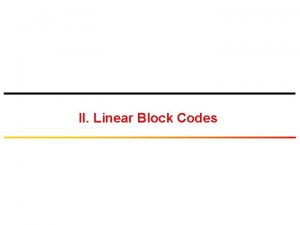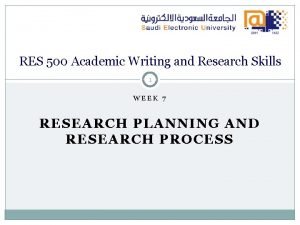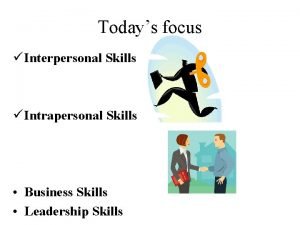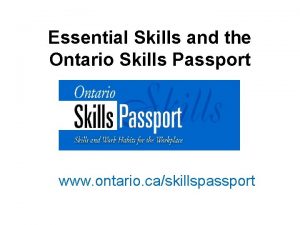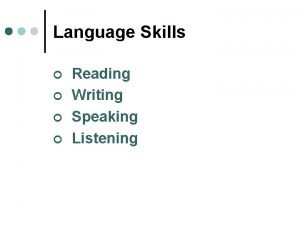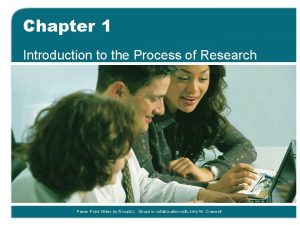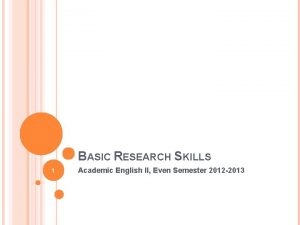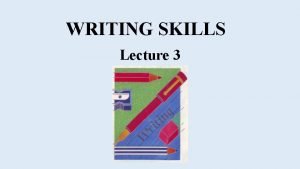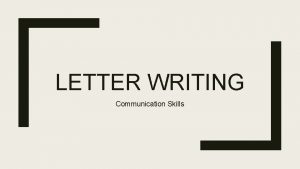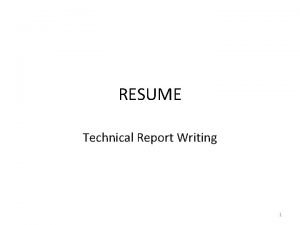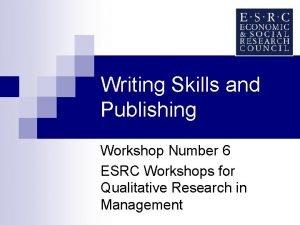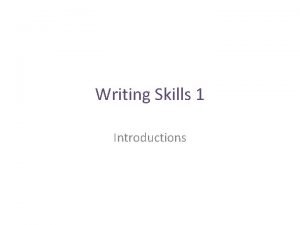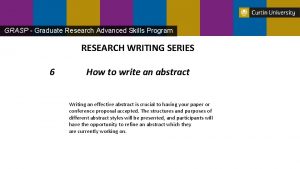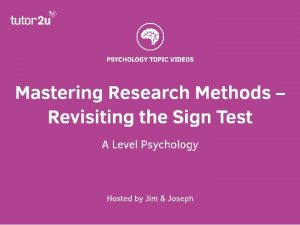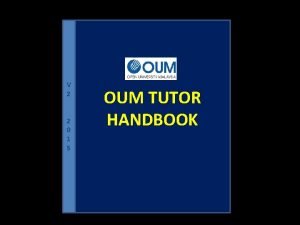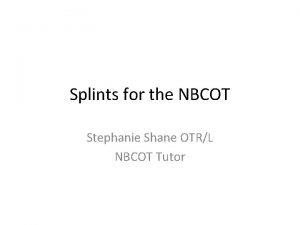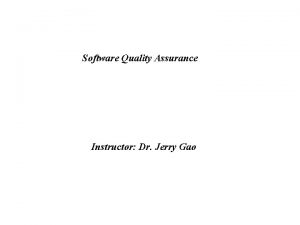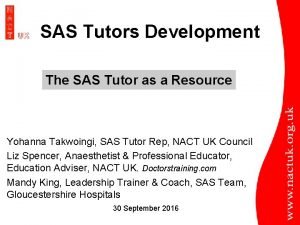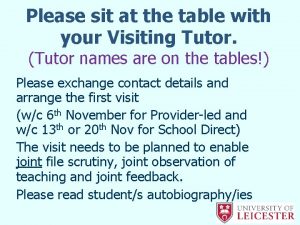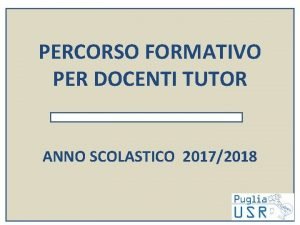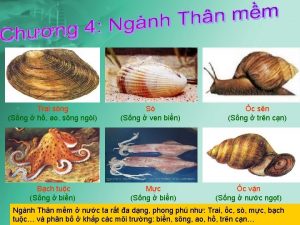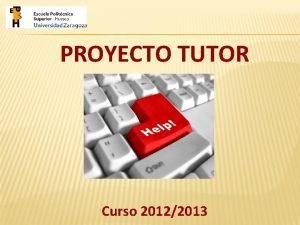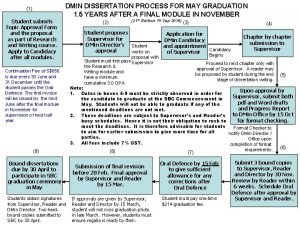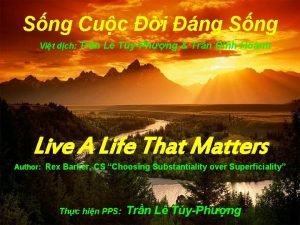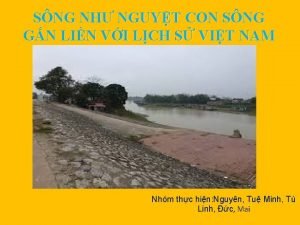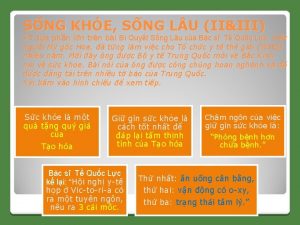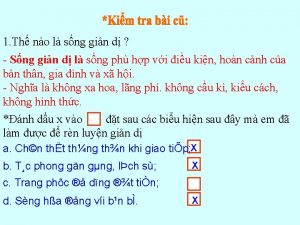DMin Research Skills and Writing TUTOR Dr Sng






































- Slides: 38

DMin Research Skills and Writing TUTOR: Dr Sng Bee beesng@gmail. com Taught by Dr. Sng Bee • Singapore Bible College Files in many languages for free download at Bible. Study. Downloads. org

Assessment o o o Research Paper % Oral Presentation % Research Proposal % Class Participation % Total 100%

Identify a Problem and Find a Solution o 1. 2. 3. 4. 5. 6. 7. In groups, discuss: A problem that you face or observe about ministry or church that you think needs a solution Share the problem with one another Write the problem in a slip of paper Two groups will combine Each group takes turns to explain their problem to the other group The other group will offer solutions The group with the problem evaluates the effectiveness of the solution suggested and sells the bottle at the best solution offered.

Evaluate Solutions to the Problem o o What do you think should be the criteria for evaluating how good a solution is to the problem, e. g. creativity, relevance? Rate the effectiveness of the solution according to the scale: 1 -5, 1 -least effective 5 – most effective Types of Solution Criteria Rating

Finding the Best Solution to Your Problem o o o Present your problem in class Explain the background of the problem Explain the present state of the problem Explain the significance of finding a solution to the problem Present the suggested solutions from the other group and the one that you picked as the best

Identifying a topic to research about Identify issues that you are concerned about o Ask questions about people and problems o Ask questions about causes of problems, people’s behaviour Practice: Evaluate the issues that grip you that leads to your choice of dissertation topic. Express your thoughts and feelings about such issues. Say why it is important to find solutions to these issues o

Research Topic and Question o Three Kinds of Questions that Researchers ask: 1. Conceptual Questions: What should we think? 3. Applied Questions: What must we understand before we know what to do? 2. Practical Questions: What should we do? 4. Choosing the right kind of question.

Conceptual Questions: What Should We Think? I am working on the topic of making changes in church Why? Because I want to know how people evaluate the risk linked to making changes in church. So what if you do? Once I do, we might better understand how emotional and rational factors interact to influence the way church members and leaders think about risk in making changes in church.

Practical Questions: What Should We Do? I’m working on the topic of communicating changes in church effectively. Why? Because I want to find out what psychological factors affect the way people assess how they’re affected by changes in church. So what? So I can tell church leaders how they can communicate changes in church to members effectively.

Applied Questions: What Must We Understand before We Know What to Do? I want to find out how church members make changes in ministries are affected by changes in church. Why? Then I can understand how members adapt to changes in church So What? Then I can understand how to help members to implement these changes.

Formulating a Research Question A research question should: 2. Be significant – e. g. there’s a problem that affects a group of people or big groups of people that you want to investigate. Your results should be of interest to people out there. o

Formulating a Research Question 3. You should be able to obtain results from your research. This means that your topic cannot be so subjective that you’ll not be able to get substantial conclusions to your study. This is also known as ‘feasibility’.

Research Questions o o You should be able to draw conclusions related to the problem You should be able to state the problem clearly and concisely

Research Questions o o o Research question is concerned with seeking solutions or answers to questions It should be of great interest to you The problem should be significant It should be delineated You should be able to obtain the information required

Qualitative Research Questions G. D. Shank, Qualitative Research: A Personal Skills Approach (USA: Pearson, 2006) o Qualitative research questions lead us to search for deeper meaning

HOW TO DECIDE ON A RESEARCH TOPIC o o o Issue – Factors to be considered Relevance – Does it really matter whether the research takes place? Feasibility – Can it be done? Coverage – Are the right things included? Accuracy – Will the research produce true and honest findings?

HOW TO DECIDE ON A RESEARCH TOPIC? o o Objectivity – What chance is there that the research will provide a fair and balanced picture? Ethics – What about the rights and feelings of those affected by the research?

Developing a Research Strategy Handbook, pp. 564 - 567 1. 2. Tapping into your own knowledge Setting goals for sources - Library and Internet sources - Primary and Secondary sources - Scholarly sources

Stages in your Research (a) (b) (c) (d) (e) Stage 1: Exploring belief systems; Stage 2: Initiating the literature review process; Stage 3: Selecting a topic; Stage 4: Exploring the literature: Identifying themes; Stage 5: Formulating a focus: Selecting/deselecting themes;

Stages in your Research (f) Stage 6: Analyzing/interpreting/integrating literature; (g) Stage 7: Closing the literature search: Reaching saturation; (h) Stage 8: Writing the review of literature; and (i) Stage 9: Evaluating the process and product (cf. Frels & Onwuegbuzie, 2010).

Onwuegbuzie, Anthony J. ; Leech, Nancy L. ; Slate, John R. ; Stark, Marcella ; Sharma, Bipin ; Frels, Rebecca ; Harris, Kristin ; Combs, Julie P. Qualitative Report, v 17 n 1 p 1677 Jan 2012. 62 pp.

Hypothesis G. D. Shank, Qualitative Research: A Personal Skills Approach (USA: Pearson, 2006) o o In qualitative research, hypothesis is appropriate in leading us to expand our understanding of a particular subject Example: if you are doing a research on how homeless mother educate their children, you may form the hypothesis that the education is informal, since homeless mothers do not have the resources to send their children to formal education

Hypothesis G. D. Shank, Qualitative Research: A Personal Skills Approach (USA: Pearson, 2006) o As researchers, we have to keep an open mind and expand our thinking on our research topic as we carry out our research

Group Discussion G. D. Shank, Qualitative Research: A Personal Skills Approach (USA: Pearson, 2006) In groups: 1. Write out a general research area that interests you 2. Generate a list of research questions or topics. Do not worry about whether they are good questions. Just brainstorm as many questions as you can. 3. Rank these questions and topics 4. Take a look at your top three choices. What do they have in common? How are they different? 5. Finally, rewrite your top choices as clearly as you can. These are now potential research questions.

Process of Carrying Out A Study Step 1 Study: Report: You decide on subject matter of study and how to carry it out. Aim or Objective of your study

Process of Carrying Out A Study Step 2 Research Study: Report: You see your tutor about the experiment you want to do. He informs you about what has been done in the topic and give you a few references to read. Background of your study and gap in research

Process of Carrying Out A Study Step 3 Study: Report: You read up on the topic and find out experts have to say about it. You can use internet sources, journals, books or database in the library. E. g. You check out on the references and find more on your own. You write down information you’ve read. Literature Review

Process of Carrying Out A Study Step 4 Study: Report: You decide on the procedure to carry out your study. You decide on the methods and procedures You carry out the study. Methodology

Process of Carrying Out A Study Step 5 Study: Once you’ve carried out your study, you observe and record your results. You then decide how to present your results, e. g. in tables, graphs or diagrams. Report: Results

Process of Carrying Out A Study Step 6 Study: Report: You analyze and interpret your results. You review your aim again and evaluate what your results show you about your aim. Discussion – Interpretation of Results Conclusions – Deductions of Results

OBJECTIVES o 1. 2. 3. 4. 5. 6. By the end of this course, you should be able to answer the following questions: What is research? What constitutes a research question? What research methods and strategies are available? How do I analyze and interpret my data? How do I draw conclusions from my data? How do I address the ethical issues surrounding my research?

Report Therefore, the Chapters in your report are: Chapter 1 – Introduction Chapter 2 – Literature Review Chapter 3 – Research Methods Chapter 4 – Results Chapter 5 – Discussion and Conclusions

Planning Your Research Plan a Schedule – refer to Handbook, p. 560. o Add the following parts after No. 10 ______ 11. Plan methodology ______ 12. Collect data ______ 13. Compile data ______ 14. Analyse data ______ 15. Interpret and Draw Conclusions from data o

Keep a Research Journal Handbook, p. 559 v v Purpose: to keep track of your activities and ideas during research Use a portable diary or notebook so that you can carry it around with you Keep a record of: 1. sources you consult, 2. leads you want to pursue, deadends, new directions, the procedure by which you carry out your method/s, analyse data and draw conclusions. Your journal is due in the last week of the course.

Assignment 1 – Group Assignment o Ø Ø Ø Ø Review your Research Proposal. Review Your Research Topic The background of your topic Your Research Aim Your Research Questions A Brief Literature Review – 200 words Brief Description of Research Methodology Expected Findings

The End Check the following website: http: //library. buffalo. edu/libraries/asl/tutorials/ Especially the “research tips” under “best basic resources”:


Get this presentation for free! Research & Writing link at Bible. Study. Downloads. org
 Sng bee bee
Sng bee bee Transpilórica definicion
Transpilórica definicion Sng bee bee
Sng bee bee Hole basis
Hole basis Hamming code 15,11 example
Hamming code 15,11 example Academic writing and research skills
Academic writing and research skills Interpersonal skills and intrapersonal skills
Interpersonal skills and intrapersonal skills Types of skills
Types of skills P+f/a
P+f/a Ontario skills passport
Ontario skills passport English reading writing speaking listening
English reading writing speaking listening Importance of research skills
Importance of research skills Basic research skills
Basic research skills Principles for teaching writing skills
Principles for teaching writing skills Functional writing examples
Functional writing examples Letter writing in communication skills
Letter writing in communication skills Conclusion for writing skills
Conclusion for writing skills Report writing resume
Report writing resume Summary writing on communication
Summary writing on communication Objectives of writing skills
Objectives of writing skills Introduction of writing skills
Introduction of writing skills Informative abstract example
Informative abstract example Spellingtutor.co.uk
Spellingtutor.co.uk White rock tutor
White rock tutor Statistical test psychology table
Statistical test psychology table Tutor oum
Tutor oum Computer as a tutor
Computer as a tutor Contemporary tabe skill workbooks level m download
Contemporary tabe skill workbooks level m download Flail arm splint
Flail arm splint Splunk ftr
Splunk ftr Sas programming tutors
Sas programming tutors 4 stages of recruitment process gcse
4 stages of recruitment process gcse Tooter tongue twister
Tooter tongue twister Visiting tutor
Visiting tutor Registro peer to peer compilato
Registro peer to peer compilato Tutor timetable software
Tutor timetable software What is model based agent in artificial intelligence
What is model based agent in artificial intelligence Part picking robot peas
Part picking robot peas Peas description for interactive english tutor
Peas description for interactive english tutor




